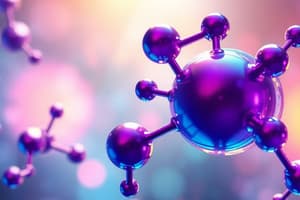Podcast
Questions and Answers
What are the two elements that organic chemistry is built upon?
What are the two elements that organic chemistry is built upon?
Carbon and hydrogen
Explain the importance of functional groups in organic chemistry.
Explain the importance of functional groups in organic chemistry.
Functional groups are responsible for the characteristic properties and reactivity of organic compounds.
What is the key characteristic of carbon that allows it to create complex structures in organic compounds?
What is the key characteristic of carbon that allows it to create complex structures in organic compounds?
Carbon's ability to form strong covalent bonds, including single, double, and triple bonds.
Give an example of a functional group in organic chemistry and its structure.
Give an example of a functional group in organic chemistry and its structure.
What role does hydrogen play in organic chemistry?
What role does hydrogen play in organic chemistry?
Name one common functional group in organic chemistry and its structure that contains a halogen atom.
Name one common functional group in organic chemistry and its structure that contains a halogen atom.
What are the six most important reactions in organic chemistry?
What are the six most important reactions in organic chemistry?
How is organic chemistry applied in the field of pharmaceuticals?
How is organic chemistry applied in the field of pharmaceuticals?
In what way does organic chemistry contribute to agrochemicals?
In what way does organic chemistry contribute to agrochemicals?
What role does organic chemistry play in materials science?
What role does organic chemistry play in materials science?
How does organic chemistry contribute to environmental science?
How does organic chemistry contribute to environmental science?
What advancements are organic chemists making with the aid of advanced analytical techniques and computational methods?
What advancements are organic chemists making with the aid of advanced analytical techniques and computational methods?
Study Notes
Discovering the Fascinating World of Organic Chemistry
Organic chemistry is a captivating field that focuses on the study of carbon-based molecules and the reactions that shape them. Carbon's unique ability to form bonds with itself and other elements gives rise to an incredibly diverse and intricate class of compounds. In this article, we'll delve into the world of organic chemistry and explore some of its most important concepts and applications.
The Building Blocks of Organic Chemistry: Carbon and Hydrogen
Organic chemistry is built upon two elements: carbon and hydrogen. Carbon's ability to form strong covalent bonds, including single, double, and triple bonds, allows it to create complex, three-dimensional structures. Hydrogen, with its single electron, readily binds to carbon, allowing it to play a crucial role in shaping the chemical and physical properties of organic compounds.
Functional Groups: The Key to Organic Chemistry
Functional groups are the reactive parts of organic molecules. They are responsible for the characteristic properties and reactivity of organic compounds. Some common functional groups include:
- Alcohols (ROH): Hydroxyl group (-OH).
- Carboxylic acids (RCOOH): Carboxyl group (-COOH).
- Amines (RNH2, R2NH, R3N): Amino group (-NH2, -NHR, -N(R)2).
- Alkyl halides (R-X): Halogen atom bonded to an alkyl group.
Reactions in Organic Chemistry
Organic compounds undergo a wide range of reactions, which can be classified into various categories. Some of the most important reactions in organic chemistry include:
- Acid-base reactions
- Nucleophilic substitution reactions
- Electrophilic substitution reactions
- Reduction and oxidation reactions
- Aldol and Claisen condensations
- Elimination reactions
Applications of Organic Chemistry
Organic chemistry is essential in various fields, including:
- Pharmaceuticals: The study of organic compounds has led to the development of life-saving drugs and the treatment of numerous diseases.
- Agrochemicals: Organic chemistry plays a critical role in the development of pesticides, herbicides, and fertilizers that enhance agricultural productivity.
- Materials science: Organic compounds are used to create a wide range of materials, such as plastics, fibers, and coatings, which have diverse applications in engineering and manufacturing.
- Environmental science: Organic chemistry contributes to the study and development of methods to reduce pollution, recycle organic waste, and improve waste disposal techniques.
Organic chemistry is a dynamic and challenging field that provides ample opportunities for discovery and innovation. With the aid of advanced analytical techniques, computational methods, and synthetic strategies, organic chemists continue to uncover new insights into the nature of organic matter and its transformations. This knowledge will undoubtedly lead to the development of even more exciting applications in the future, transforming the world in ways that we can only begin to imagine.
Studying That Suits You
Use AI to generate personalized quizzes and flashcards to suit your learning preferences.
Description
Delve into the captivating field of organic chemistry, focusing on carbon-based molecules and their reactions. Learn about the building blocks, functional groups, reactions, and applications that shape this diverse and intricate class of compounds.




